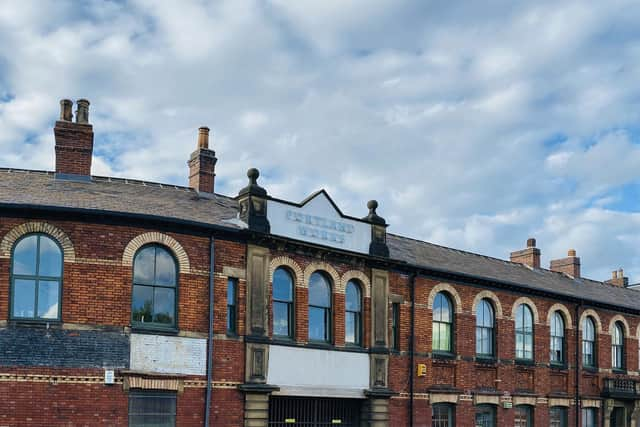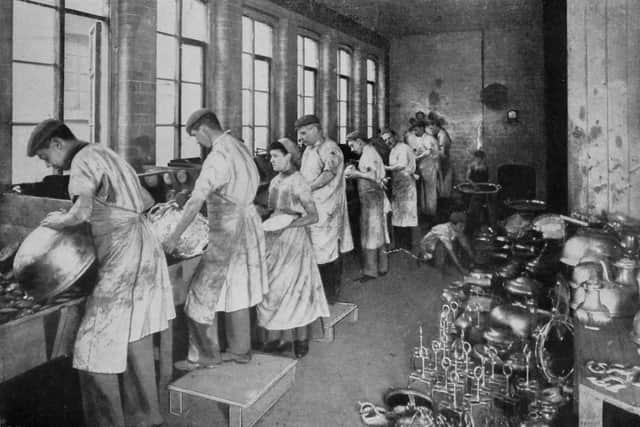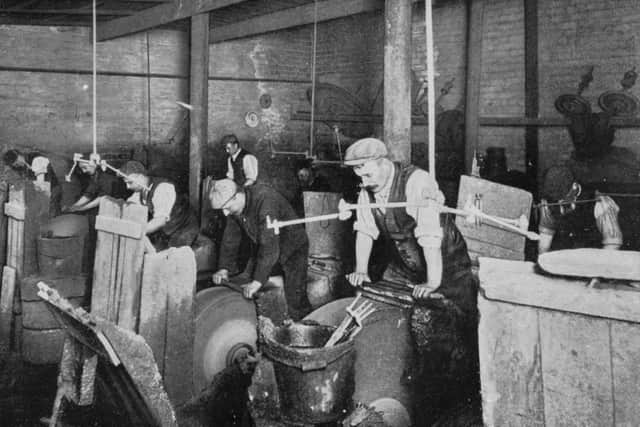Exciting plan for telling story of Sheffield's historic Portland Works
and live on Freeview channel 276
This is thanks to a £134,400 grant from the Cultural Recovery Fund which is helping cultural and heritage organisations with their operating, reopening and recovery costs during the Covid pandemic.
Portland Works has the unique distinction of being not only an historic site of worldwide significance, but it is also a living, breathing place which is home to around 30 independent makers who have their workshops within the building, and whose skills and craftsmanship continue the tradition of Sheffield’s famous Little Mesters into the 21st century.
Advertisement
Hide AdAdvertisement
Hide AdFree downloadable learning packs and resources will encourage teachers, educators, and young learners to take an imaginary journey back in time and discover what life was like for children living close to and working in Portland Works in Victorian Sheffield. Closely linked to National Curriculum learning objectives, the activities will enable children to learn about Sheffield’s social history through engaging and imaginative activities including creative writing, art and design, and role play, all based around the people, stories, and events in Portland Works’ history.


The invention of stainless steel cutlery revolutionised cutlery manufacture and was a major development in Sheffield’s industrial history cementing the city’s place as world leader in cutlery manufacture.
Portland Works was established in 1879 by cutlery manufacturer Robert Fead Mosley, in a late-Victorian world where child mortality was 25% amongst the under-fives and where child deaths represented half of all deaths in Sheffield General Infirmary, largely due to poor sanitation and diet deficiencies – many working-class children lived on a diet of bread and tea.
Children as young as eight worked in Sheffield’s cutlery factories, where decorative tableware was produced for the emerging middle classes who wanted to imitate the lifestyles of the gentry.
Advertisement
Hide AdAdvertisement
Hide AdStanding at the main entrance to Portland Works today you can imagine the noise and bustle as horse-drawn carts delivered raw steel bars, which would make their journey around the works, emerging as ornate and polished items in wooden presentation cases lined with satin and velvet, on their way to destinations around the world.


Some would no doubt make the much shorter journey to a popular new Sheffield retailer, Cole Brothers, which opened at the bottom of Fargate at around the same time as Portland Works.
Harry Brearley, the inventor of stainless steel cutlery, was himself born into poverty near the Wicker in 1871 and went to work at the age of 12 as a cellar lad, running errands for the workers in Thomas Firth and Son’s crucible steel works.
He worked his way up from his first promotion as bottle washer in the firm’s chemical laboratories to being a laboratory assistant, taking evening classes for several years in steel production and chemical analysis methods.


Advertisement
Hide AdAdvertisement
Hide AdBy his 30s, Harry was well regarded as an experienced professional, eventually taking charge of the Firth and Brown Research Laboratories (later Firth Brown Steels). It was Harry’s work on tackling the problem of metal erosion in rifle barrels which led to the discovery for which he is famous today, an erosion-resistant steel alloy with chromium and carbon which he called ‘rustless steel’.
However, Harry’s employers showed little interest in the armament potential of the new alloy and so Harry approached cutlery manufacturers with a view to using his invention to create rustless cutlery which would not require daily cleaning and polishing.
He worked closely with Ernest Stuart, cutlery manager of a local firm, F R Mosley & Co of Portland Works, to successfully manufacture a trial batch of cutlery in the factory; at Ernest’s suggestion the name was changed from ‘rustless’ to ‘stainless,’ and so stainless steel was born at Portland Works and changed the way that steel was made forever.
By creating a Learning Hub at Portland Works it is hoped that the story of this ground-breaking invention and its creator can be shared to a wider audience and that children and young people will be inspired by the story of stainless steel, whilst also learning about the wider social history surrounding the factory and its past.
Advertisement
Hide AdAdvertisement
Hide AdThe Learning Hub will also contain archive material and study resources for university students and independent researchers.
Portland Works’ heritage and history is closely connected to its present and its future; it is as much a place of makers today as it was in its Victorian and early 20th century heyday.
It has survived two world wars, was rescued from dereliction eight years ago and is now run as a community enterprise where today’s Sheffield makers have found their home in one of the last remaining examples of a purpose-built metal trades factory. Several of them practise traditional trades such as Andy Cole, who has used the building’s 19th-century forge to make tools since 1978, engraver Mick Shaw, pocket-knife maker Michael May and lino-cutting tools manufacturer Pam Hague.
Thanks to the Cultural Recovery Fund, which has recognised the importance of this unique site, Portland Works now has a chance to secure its future, support its tenant businesses through these unprecedented times and extend its learning and outreach opportunities for the people of Sheffield and beyond.
Advertisement
Hide AdAdvertisement
Hide AdThe Portland Works Learning Hub will shortly be available online at https://www.portlandworks.co.uk/ and will contain free downloadable resources for key stages 1 and 2, with packs for other key stages, higher education resources and archive and research material to follow.
It will ensure that the story of Portland Works and its important place in Sheffield’s history is told to the children who will become the apprentices, craftspeople and makers of tomorrow and who will proudly stand on the shoulders of the greats who went before them to ensure that Sheffield’s rich industrial heritage, as embodied by Portland Works, is appreciated, understood, and passed on to future generations.